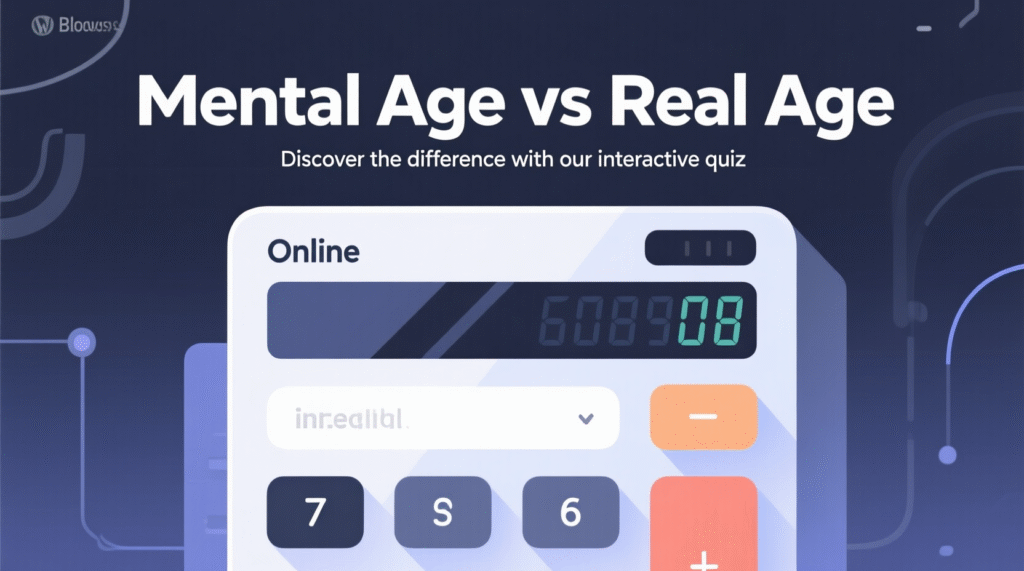
Have you ever felt younger—or older—than your birth certificate says? That’s the essence of comparing mental age vs real age. While your real age is fixed, your mental age reflects how your mind thinks, feels, and reacts. Understanding the gap between the two can reveal a lot about personality, maturity, and even lifestyle.
What Is Real Age?
Your real age—also called chronological age—is simply the number of years since you were born. It’s objective, fixed, and used in everything from legal rights to health records.
- Real age = time lived.
- It determines milestones: voting, driving, retirement.
- It does not account for how your brain or personality develops.
What Is Mental Age?
Your mental age describes the intellectual or emotional level you function at compared to the average for different ages.
- Originates from early IQ research by Alfred Binet.
- Example: If a 10-year-old performs like an average 12-year-old, their mental age = 12.
- Broader today: mental age is also used informally to reflect how “young at heart” or “wise beyond years” someone feels.
Unlike real age, mental age is flexible—it can be shaped by experiences, education, maturity, and mindset.
Start with our accurate mental age test to see how your score compares to your real age.
Mental Age vs Real Age: Key Differences
| Aspect | Real Age | Mental Age |
|---|---|---|
| Measurement | Time since birth, in years | Intellectual or emotional development |
| Flexibility | Fixed, unchangeable | Shifts with mindset, lifestyle, learning |
| Use Cases | Legal, medical, chronological | Psychology, quizzes, self-reflection |
| Influenced By | Biology, time | Environment, personality, maturity |
| Example | A 30-year-old person | A 30-year-old who “feels” 20 or 40 |
This table makes it clear: real age is about the body, mental age is about the mind.
Why the Gap Between Mental and Real Age Matters
When mental age and real age don’t match, it can explain behaviors and choices:
- Younger mental age: Playful, adaptable, curious; may take more risks.
- Older mental age: Responsible, cautious, thoughtful; may prefer stability.
- Big gaps: A 25-year-old who acts 40 may be seen as mature, while a 40-year-old who feels 25 might radiate energy and creativity.
Neither is “better.” The key is understanding the difference and how it shapes your daily life.
Learn how the test works and why it matters in importance of mental age test.
Self-Reflection: How Old Do You Feel Inside?
Ask yourself:
- Do I connect more with people younger, older, or the same age as me?
- Do I react to stress calmly (older mental age) or impulsively (younger mental age)?
- Do I feel younger or older than my years when trying something new?
Your answers may reveal if your mental age runs ahead, lags behind, or balances with your real age.
To measure your maturity scientifically, try our psychological maturity test.
FAQs
1. What is the difference between mental age and real age?
Real age is your biological years lived; mental age is how your mind performs or feels compared to average norms.
2. Can your mental age be younger than your real age?
Yes. You may feel or think younger than your chronological age, especially if you’re adaptable, creative, or playful.
3. Can mental age be older than real age?
Yes. People often say someone is “wise beyond their years” if their mental age is higher.
4. Does mental age change over time?
It can. Life experience, learning, stress, and personal growth all shape it.
5. Why does it matter if my mental age and real age are different?
The gap can affect relationships, career choices, and how you view life. It’s not about right or wrong—it’s about self-awareness.
Final Thoughts
Mental age vs real age is about understanding the difference between years lived and how old your mind feels. Real age is fixed; mental age is fluid. Recognizing the gap helps explain personality traits, decision-making, and even how others see you.
Knowing your mental age doesn’t just satisfy curiosity—it can help you align your lifestyle with who you really are inside.
- To fully grasp the concept, it helps to compare mental age vs chronological years directly.
- Many people are unaware of the specific differences that distinguish these two metrics.
- You might be wondering why this measurement is important for your personal development.
- It is quite common to find that your mental level is higher than the age on your ID.
- Clarifying the distinction between mental age and IQ prevents common misunderstandings.
- Some assessments focus on maturity vs mental age to provide a different perspective.
- You should also explore how this relates to your intellectual age for a complete profile.